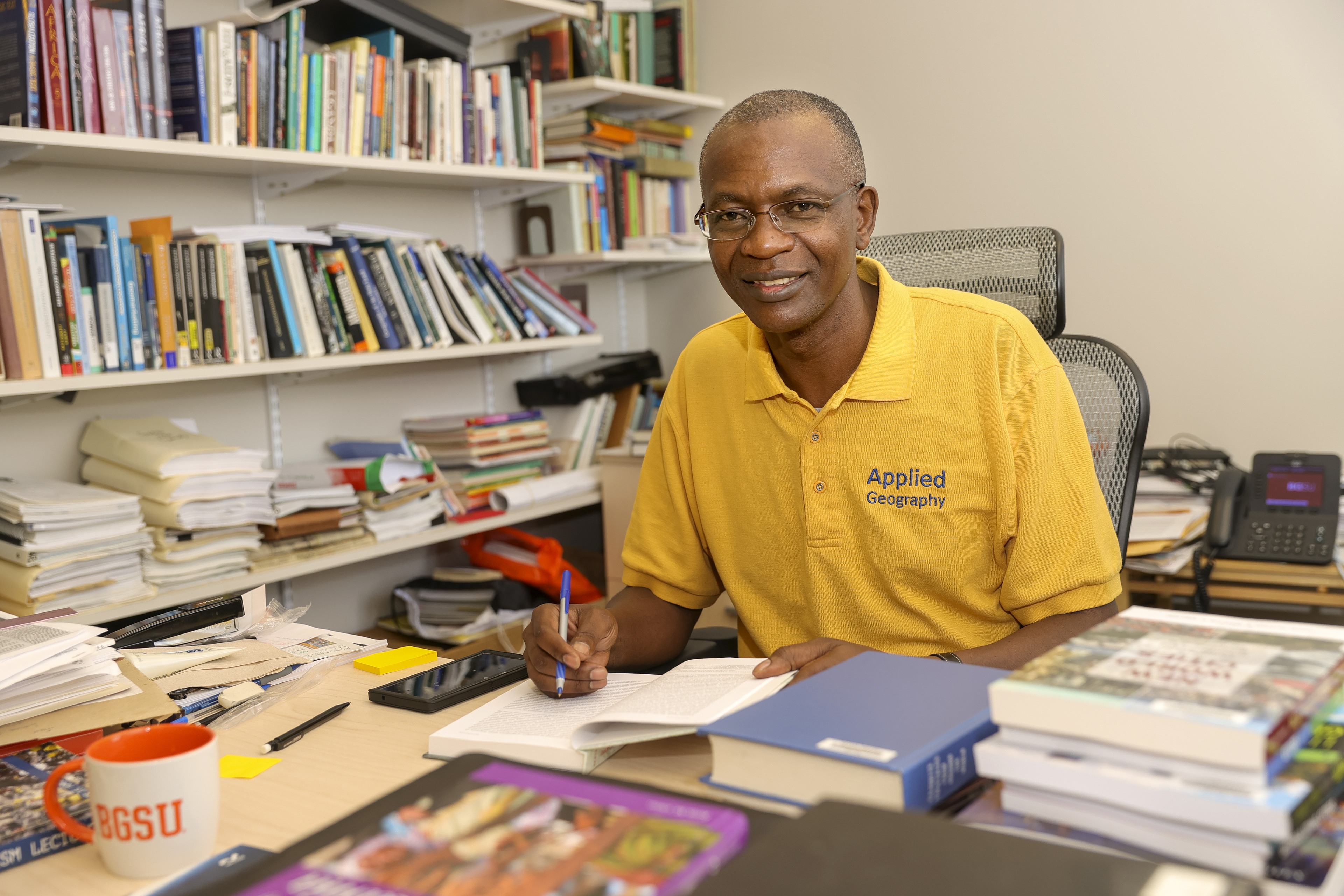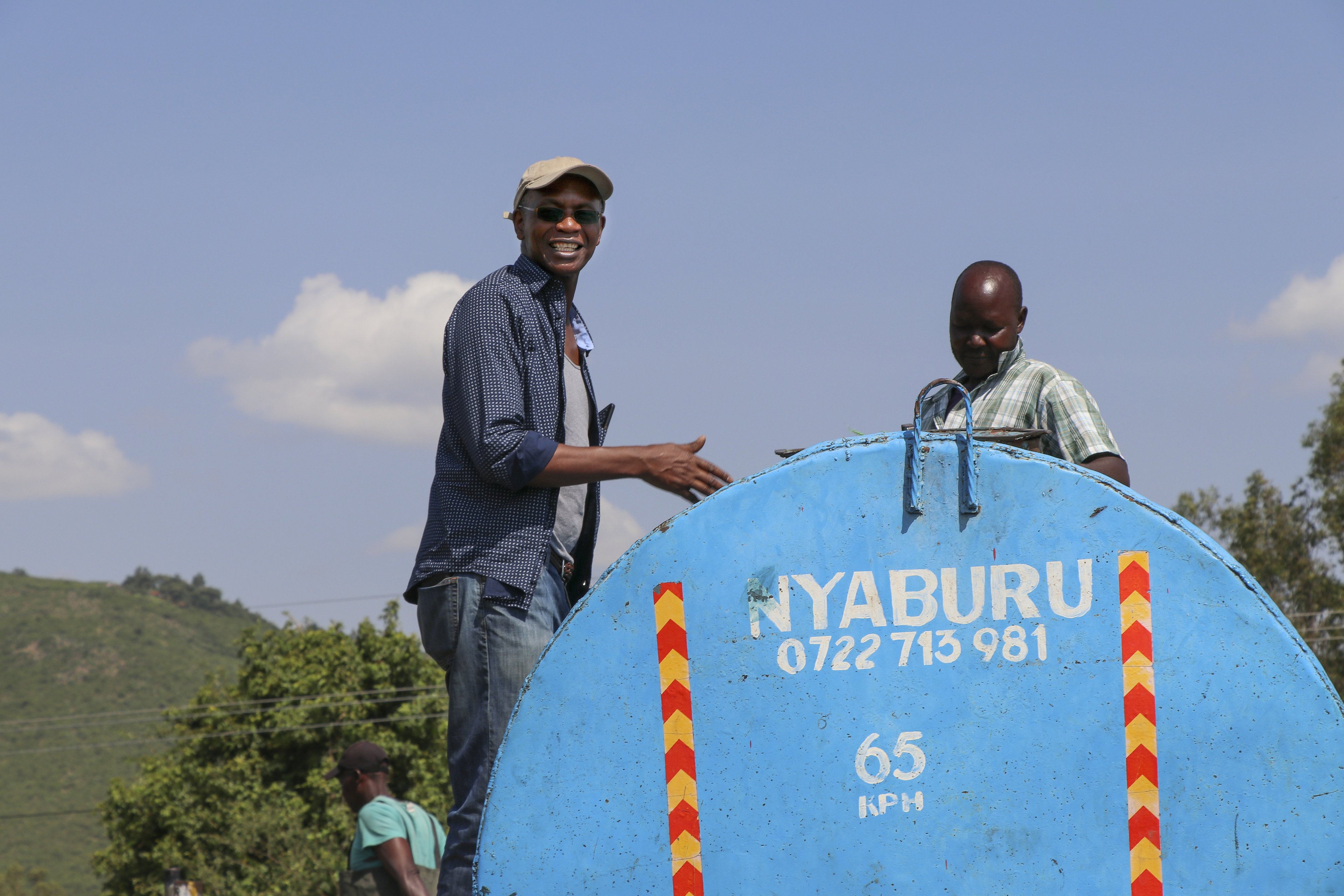
BGSU professor’s founding of international scholarship organization helps facilitate connection between BGSU, Kenya
Estimated Reading Time:
Dr. Kefa Otiso was one of the original founders of KESSA, which is now the largest organization of its type for Kenyan studies in the U.S.
BGSU has a global impact, and when it is educating students from a country, what you’re seeing is a bilateral and mutual benefit.
- Dr. Kefa Otiso
After Dr. Kefa Otiso began to find his footing in academia, he and other similar scholars from the Republic of Kenya found themselves in search of something that didn’t exist yet.
Otiso, a geography professor who arrived at Bowling Green State University in 1999, has extensively studied African immigration to the U.S. as one of his primary research interests and has just published a co-edited volume called, "African Immigrants and the American Experience: Race, Anti-Black Violence, and the Quest for the American Dream."
But when it came time to network with other professionals who did similar scholarly, scientific and research work on Kenya, they discovered no central network existed.
“In the five years or so after you finish graduate school, you’re finding out you need a network and the support systems that come from these types of organizations, but one didn’t exist,” Otiso said. “Basically, we decided to work on one.”
In 2008, Otiso became one of the founders of the Kenya Scholars and Studies Association (KESSA) along with Maurice Amutabi, C. Gichana Manyara and Francis Koti, and the organization maintains its headquarters in Bowling Green to this day. Otiso was the founding president while Amutabi served as vice president and Manyara and Koti respectively served as treasurer and secretary.
At the time, immigration and student inflows – from Kenya specifically and Africa in general – were beginning to gather steam in the U.S., increasing the need for such an organization.
In the years prior to KESSA’s formation, similar organizations from other African countries had not lasted, so there was concern about KESSA’s long-term viability. But Otiso said he was adamant that the Kenyan scholars already in the U.S. had to at least try to form an organization to aid those who came after them.
“Some of the senior scholars from Kenya were saying that maybe we didn’t have enough people and it wasn’t going to fly, but I said, ‘Well, let’s try, and if it fails, it fails,’” Otiso said. “Lo and behold, it actually ended up thriving, and you can’t talk about KESSA succeeding without BGSU. The University has been very supportive since the beginning.”
The organization held its first conferences, from 2008-13, at the Bowen-Thompson Student Union, and in turn, Otiso said BGSU became an epicenter on Kenyan studies in America. Dr. Jendayi Frazer, a Stanford alumnus who became the U.S. Assistant Secretary of State for African Affairs, agreed to give the keynote at the 2008 conference, which was attended by Kenya's then-ambassador to the U.S., Peter Ogego, and reported on by the country's largest daily newspaper, The Daily Nation.
The success of the first conference at BGSU helped the organization increase its presence, gain new members and eventually thrive. Since KESSA's inception, Kenyan ambassadors have attended every conference either in-person or virtually.
Two BGSU doctoral students, Irene Baraza (photochemistry) and Carren Burkey (biology) also presented papers at the just-concluded KESSA conference in Atlanta.
Lazarus O. Amayo, Kenyan ambassador to the United States
Elkanah Odembo, former Kenyan ambassador to the United States
Dr. Beatrice M. Inyangala, principal secretary of Kenya's Ministry of Education
Eve Obara, member of Parliament, Kenya
Dr. Wahome Rureri, office of the Principal Secretary, Kenya's State Department for Higher Education and Research, Ministry of Education
Rosaline K. Njogu, principal secretary of Kenya's State Department for Diaspora Affairs, Ministry of Foreign and Diaspora Affairs
Peter Ogego, former Kenyan ambassador to the United States
In part due to his co-founding of the organization, Otiso was awarded "The Elder of the Order of the Burning Spear" national award in 2008 by former Kenyan president Mwai Kibaki.
KESSA now counts more than 500 scholars and professionals and about 1,000 students among its members, making it the largest organization of Kenyan scholars and students in the U.S.
BGSU has ties to Kenya dating back to the late 1950s. Dr. James B. Karugu ‘62, who enrolled at BGSU in 1958 and was the first ever Kenyan to graduate from BGSU, became Kenya’s second-ever attorney general from 1980-81.
While Karugu diffused information about his BGSU experience to his home country, Otiso said he and other Kenyan scholars felt an obligation to help the next generation.
“Part of KESSA's origin was that we said, ‘OK, what are we going to do to make life easier for someone else who is coming after us?’” Otiso said. “I think, in general, we all have a responsibility to make things easier for the next generation.”
During its existence, KESSA has not just found long-term stability but served as a conduit for creating partnerships.
While KESSA began in part to facilitate connections for the next generation of scholars, it also has played a part in the existing academic collaboration between BGSU and Kenya. The connection between the University and KESSA helped market BGSU in Kenya and beyond, and the organization has always counted BGSU students from Kenya among its members.
“The mentorship that we give them enables them to succeed academically and professionally, thereby helping to spread the University's wings even further,” Otiso said. “BGSU has a global impact, and when it is educating students from a country, what you’re seeing is a bilateral and mutual benefit. These students not only help our institution to remain vibrant, they also help BGSU go global and make the University's impact in places like Kenya real."
BGSU has its largest number of Kenyan students in six years during the 2023-24 school year, and the University's researchers are undertaking a yearslong, NSF-funded collaboration with researchers from Kenya Marine and Fisheries Research Institute (KMFRI); Kisii University; Technical University of Kenya; the African Center for Aquatic Research and Education; and the University of Windsor to confront a problem shared by both Lake Erie and Lake Victoria: algal blooms and water quality.

The project came in part due to a memorandum of understanding signed between BGSU and Kisii University in 2015, when Otiso undertook a Carnegie African Diaspora Fellowship at the latter institution. What started as a simple conversation between researchers at the two institutions has allowed for the bond between our two universities and BGSU and Kenya to become stronger than ever.
“This is an example of the University’s impact not just locally, regionally or nationally, but internationally," Otiso said.
“Any really good partnership is mutually beneficial – you gain from them and they gain from you. The BGSU-Kenya partnership is one of those cases where the sum is greater than its elements, and that creates synergies you would not be able to otherwise.”
Related Stories
Media Contact | Michael Bratton | mbratto@bgsu.edu | 419-372-6349
Updated: 04/24/2024 09:46AM




